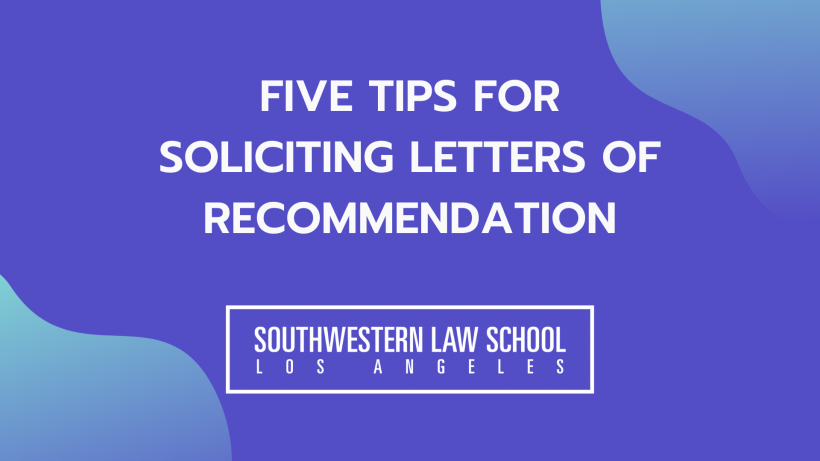SWLAW Blog | Future Students

September 20, 2021
How to Apply with Strong Letters of Recommendation: Our Dean of Admissions Shares Her Top Tips!
 Dean of Admissions Lisa Gear has seen many a letter of recommendation – some that leave a lasting and positive impression, some that underwhelm, and some that have even been later rescinded by the recommender. As an applicant, you may be worried about the lack of control you have over this part of your carefully crafted application. But with advance planning, good judgment, and solid relationships in place, you do have the opportunity to let letters of recommendation work in your favor.
Dean of Admissions Lisa Gear has seen many a letter of recommendation – some that leave a lasting and positive impression, some that underwhelm, and some that have even been later rescinded by the recommender. As an applicant, you may be worried about the lack of control you have over this part of your carefully crafted application. But with advance planning, good judgment, and solid relationships in place, you do have the opportunity to let letters of recommendation work in your favor.
Check out Dean Gear’s five tips below – and don’t miss the bonus tip at the end!

If less than two years out from college or graduate school, choose at least one academic recommender. If more than two years out, professional letters may be appropriate. If you worked while attending school, a combination of academic and professional letters may be appropriate.

Consider the depth of the recommender’s knowledge about you. How familiar are they with your background and your desire to attend law school? The more familiar, the better! If helpful, provide each recommender a copy of your personal statement, transcript, resume, and anything else they request. Setting up a meeting to discuss your law school goals is a great place to start the process.
Avoid considering a recommender that doesn’t actually know you well. Selecting those in prominent positions based on title or prestige alone - such as partners at law firms, senators, district attorneys, judges, etc. - won’t help your application if they don’t have a meaningful relationship with you and don’t have direct knowledge of your work. Choosing prominent individuals who are simply family friends, or worse, actual family members, will look like you are trying too hard (and not in the right way).
Another reason to make sure the recommender is well‐acquainted with your background is to minimize the potential that they might write more about their own accomplishments than yours (yes, it does happen!).

Ask each potential recommender three questions:
One: Would you be willing to write a letter of recommendation for my law school application?
Two: Would you be able to submit the letter of recommendation by [insert date at least 6 weeks before you plan to submit your application]?
Three (most importantly): Would your letter be a positive endorsement?
If the potential recommender does not answer affirmatively to any of these questions, don’t be discouraged. Think of it as an opportunity to find an even stronger source, and be comforted by the fact that you are not relying on someone who cannot provide you a strong and timely letter.

If you have significant accomplishments that you would like highlighted, or if you are part of an academic honors program that is well‐renowned at your institution, ask your recommender to mention some of these items to give them additional weight. Admissions committee members cannot be familiar with all courses of study or undergraduate schools. Extra context from the recommender will help underscore the strength of your performance within that setting.

Law schools evaluate and use recommendation letters differently. Depending upon the overall strength of the numerical indicators (LSAT and/or UGPA), greater or lesser weight may be placed on the letter(s). In addition, while schools will have a minimum number of letters that are required, applicants should avoid submitting the maximum number unless each letter adds significant value to the application. Focus on quality over quantity and be judicious in all aspects of crafting the application.

Lastly, there is never a reason to have a letter of recommendation from a family member, regardless of how prestigious their job might be, or how much they want to support you.
Remember - This is an exercise in good judgment!